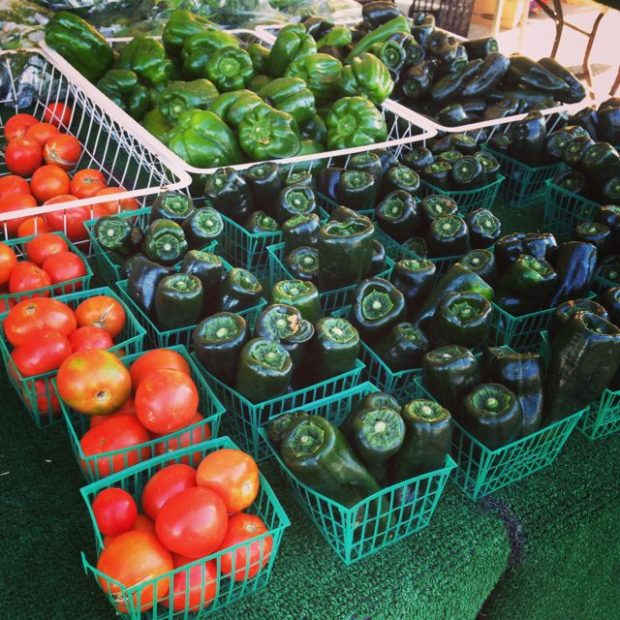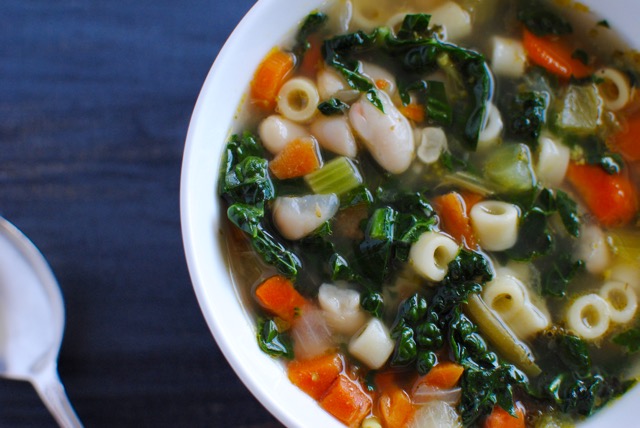Recently an article about organic vs. conventional produce got me REALLY fired up.
The claim: conventional produce is just as healthy for kids as organic, and pesticides aren’t really a big deal.
In simple terms, this is B.S.
Sure, eating fruits and vegetables of any kind is better than not eating fruits and vegetables. And conventional produce is definitely healthier than eating processed food and candy. We all agree on this.
But to say that pesticides (aka toxic chemicals that are not tested for safety before use) are no big deal? You better have some seriously good research to back that up, and this author did not. Not surprisingly, her “evidence” came largely from pesticide and chemical industry advisors who claim pesticides are safe.
The Environmental Working Group wrote a great response to the Organic Shmorganic article, detailing why organic and conventional produce are in fact different, and why children are especially vulnerable to pesticide exposure.
Below are just a few of the reasons I continue to believe organic produce is healthier than conventional.
7 Reasons Organic Produce is Healthier than Conventional
- Research shows that families who eat mostly organic have 90% fewer pesticides in their bodies than those who mostly consume conventional foods.
- Kids who eat organic produce for just 5 days have significantly lower pesticide levels in their urine than those who eat conventional, according to research by Dr. Alex Lu, one of the leading researchers on pesticides in this country.
- Children, especially unborn babies, are much more vulnerable to pesticides than adults. Research suggests that early pesticide exposure could lead to learning disabilities, shortened attention span, reduced IQ and possibly cancer. Both the American Academy of Pediatrics and the President’s Cancer Panel recommend avoiding pesticides in food whenever possible.
- We don’t have tons of research on how long-term pesticide exposure affects our health or our children’s physical development. We do know, however, that the incidence of cancers and many neurodegenerative diseases is the highest it’s ever been. Whether these are related – no one has said for sure – but who wants their kids to be the guinea pigs?
- The Environmental Protection Agency’s recommended exposure limits for pesticides could be considered somewhat arbitrary. Whose to say these limits are the final word on pesticide safety?
- Farm workers and families that live near conventional farms suffer all sorts of negative impacts from pesticide exposure. If pesticides are toxic to those who work with them, how do we know they’re safe for us to consumer over the course of our lifetime?
- Over 700 chemicals are brought to market every year. None of these are tested for safety first (though many are later deemed to be harmful to human health and then banned), so when we choose conventional products, we really have no way of knowing what’s safe or not.
Yes, organic produce (and most organic food) is more expensive, and thus out of reach for many people. But if you can afford it, organic is worth paying a little more.







10 Comments
Megan (The Lyons' Share)
March 16, 2014 at 8:14 amAgree wholeheartedly! I recently did a myth buster about the claim that organic produce has more NUTRIENTS than conventional (they are almost always the same), BUT I still agree that organic is very important, and any step we can take towards buying organic is better than nothing! I always recommend starting with the “Dirty Dozen”!
Amelia Winslow
March 16, 2014 at 1:13 pmThanks for your comment, Megan! It’s actually still unclear whether organic is more nutrient-dense, because all the research on this has been on within-company produce. For example, Driscoll’s studied their organic strawberries vs Driscoll’s conventional – so the berries are grown right next to each other in the same environment, which means cross-contamination is likely. They also may have converted conventional farmland to organic sometime before 3 years earlier. It’s also hard to compare two items grown by the same company b/c many of the practices on their conventional & organic products are the same. Hopefully sometime we’ll have research coming from small family farms that have been practicing organic farming their whole existence!
Tara
March 17, 2014 at 6:06 amWhen I origininally read the article mentioned a couple weeks ago I was so irritated! So little evidence to back up any of the author’s opinions on organic vs conventional. Ugh! I love EWG’s reponse and your points here. I believe there is simply not enough evidence to prove conventional pesticides are safe, so I’d rather budget and buy as much organic food for my family as possible rather than just crossing my fingers that pesticides on produce are safe. I really hope people don’t read the Slate article and suddenly feel like this is a person that has actual scientific to evidence to backup her ideas that conventional produce pose no harm and instead do more thorough research on their own to determine what is best for them.
Amelia Winslow
March 17, 2014 at 10:44 amSo agree with you, Tara. Thanks for your comment!
shelley
March 17, 2014 at 1:32 pmThank you so much for this! I find that many people who think choosing organic foods is trendy or not worth it are the same who resist change of any kind–from recycling to switching from incandescent light bulbs . In fact, I have a family full of these nay-sayers. I hope a saturation of facts from resources like EME eventually forces changes in food labeling, processing, and distribution.
Amelia Winslow
March 17, 2014 at 1:46 pmThanks for the support, Shelley! This topic is very controversial (I don’t get it!), so I think it’s important to speak up.
Megan (The Lyons' Share)
March 22, 2014 at 5:11 amThat’s great to know, thanks for the follow up! I’ll take another look at the studies I’ve been reading. YES – let’s hope for future research!
Nancy Coulter-Parker
March 28, 2014 at 1:34 pmOrganic is also Non-GMO. When the organic rules were written in the 90s, the organic activists and farmers foresaw what was coming…what we are only just learning about now. They wrote into the National Organic Program that GMO ingredients cannot be used in organic products. Whatever your stance is on GMOs, you can rest assured that when you buy an organic product, it does not contain GMOs.
Also for meat and dairy products, organic goes beyond pesticides to hormones and antibiotics. Hormones and antibiotics cannot be given to any animals that produce dairy or which are used for organic meat. In conventional products, hormones and antibiotics are used on animals, to increase output to name but one reason.
Amelia Winslow
March 30, 2014 at 12:39 pmVery good points, Nancy! For this post I was just focusing on pesticides, but I agree of course with everything you’ve added — so many benefits to organic!
Christy
August 20, 2014 at 4:54 pmWhile organic food might be lower in pesticides, it has a larger carbon footprint than locally-grown produce.
“The study found that the environmental cost of greenhouse gas (CO2) emitted to transport 20 tonnes of organically grown produce was comparable to that of bringing the same amount of conventional fruit and vegetables to market.”
http://www.eurekalert.org/pub_releases/2007-06/uoa-ofm060607.php
While organic standards may preclude the use of synthetic inputs, organic farms often utilize so-called “natural” pesticides and what Miller calls “pathogen-laden animal excreta as fertilizer” that can also end up making consumers sick and have been linked to cancers and other serious illnesses (like their synthetic counterparts).
http://www.scientificamerican.com/article/organic-still-a-small-slice-of-the-pie/
http://www.washingtonpost.com/national/health-science/the-environmental-footprint-of-organic-vs-conventional-food/2012/09/14/40b16582-fb65-11e1-b2af-1f7d12fe907a_story.html
Instead of buying organic, I buy local. I go to the farmer’s market all the time, and buy from vendors that state they are pesticide-free. It’s less harmful to the environment (as the food only travels 20 miles, instead of 2,000), and healthier, since it’s picked at the peak of freshness, instead of before they are ripe and allowed to ripen on the trip. This preserves precious nutrients.